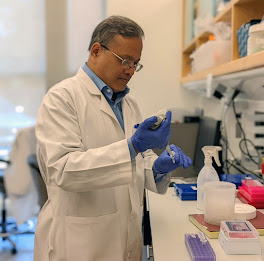Pancreatic cancer is a highly lethal malignancy with a rising incidence in the United States and other developed countries. According to the National Cancer Institute, pancreatic cancer is the third leading cause of cancer-related deaths in the United States with a five-year survival rate for patients at just 11.5%. High mortality of pancreatic cancer is largely attributed to its late-stage diagnosis, when only limited therapeutic options are available. Hence, an earlier detection of pancreatic cancer could help save many lives or extend patients’ survival.
 |
| Santanu Dasgupta, Ph.D., assistant professor of pathology, is a cancer researcher and one of the principal investigators of the project. |
Dasgupta, who is also an assistant professor of pathology at the Frederick P. Whiddon College of Medicine at the University of South Alabama, said the goal is to develop a simple mitochondrial DNA-based blood test to detect this lethal disease early, before it spreads. “At the same time, we want to develop ways to target malfunctioning mitochondria as a therapeutic strategy for pancreatic cancer,” he said.
Ajay Singh, Ph.D., a professor of pathology and leader of the cancer biology program at the MCI, co-led the project with Dasgupta. “Mitochondria are of significant interest for developing highly sensitive biomarkers, since typically each cell in our body contains multiple mitochondria, and each mitochondrion has numerous copies of mitochondrial DNA,” he said.
“Extracellular vesicles have emerged as promising tools for cancer diagnosis in recent years,” added Singh, who has more than 20 years of experience in pancreatic cancer research. “Since these vesicles can be traced back to their cells of origin, a test based on them could be highly accurate.”
The University of South Alabama filed a provisional patent application based on these findings to protect the intellectual property rights. Dasgupta, Singh and their team are working to generate additional supporting data from larger cohorts of patients and develop an assay that could work in clinical settings. They are also investigating if their approach could be expanded to other cancers.
Contributing authors from the MCI and the Whiddon College of Medicine are Kunwar Somesh Vikramdeo, Ph.D., a postdoctoral researcher; Shashi Anand, Ph.D., a postdoctoral researcher; Mohammad Aslam Khan, Ph.D., a senior research associate; Martin Heslin, M.D., M.S.H.A., a surgical oncologist and director of the MCI; and Seema Singh, Ph.D., professor of pathology and a senior member of the cancer biology program. Moh’d Khushman, M.D., formerly a medical oncologist at the MCI and currently an associate professor of medicine in the division of hematology-oncology at Washington University in St. Louis, also contributed to this research.
The study was recently published in Scientific Reports, a peer-reviewed journal from the Springer Nature Group that publishes original research from across all areas of the natural sciences, psychology, medicine and engineering.

